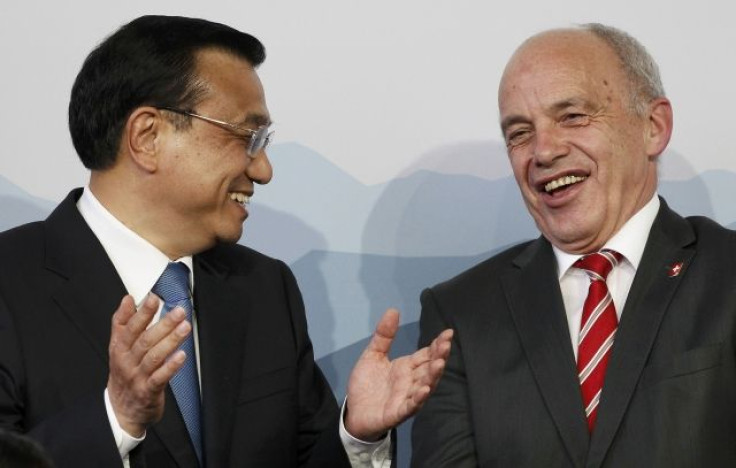China, Switzerland Ink Free Trade Deal During Chinese Premier Li Keqiang’s Visit To The Alpine Nation

China and Switzerland on Friday reached consensus on a bilateral free trade agreement, the first of its kind between China and a major Western economy.
The framework of the agreement was signed in Bern by the Swiss and Chinese delegations during Chinese Premier Li Keqiang’s visit to the Alpine nation.
In China, the achievement was hailed as a “milestone” by political leaders and business community, state-run news agency Xinhua reported, while Swiss media said the deal was one of the most important international deals in 40 years for the nation.
“This free-trade deal is the first between China and a continental European economy, and the first with one of the 20 leading economies of the globe,” Li told reporters after the preliminary agreement was signed, the BBC reported.
“This has huge meaning for global free-trade,” he added.
Swiss President Ueli Maurer described the agreement as a “real milestone.”
China is the third major trading partner of Switzerland, an EU non-member.
Switzerland is the first European stop on Li's maiden foreign trip since taking office in March.
The visit came amid concerns about a possible trade war between China and the EU over solar energy products.
Trade between China and Switzerland topped $30 billion in 2011, a 50 percent jump compared with that of 2010. Last year, the trade was hit by worries over the euro zone debt crisis and registered a volume of $26.3 billion, according to Xinhua.
Li said in a signed article published on Thursday in Neue Zuricher Zeitung, a German-language Swiss daily that the agreement showed that China will not stall the opening up of its markets and it is committed to upholding the multilateral trading regime, promoting regional trade liberalization, and accelerating the implementation of the free trade agreement strategy.
The concluded agreement applies to the trade of goods -- both industrial and agricultural -- non-tariff trade barriers, the promotion of investments, and economic and technical cooperation, among others, the Swiss foreign ministry said in a statement.
The agreement establishes a joint committee to monitor implementation and development of the agreement and provides a mechanism to settle disputes.
International security issues including the situation on the Korean peninsula and the Middle East also formed a part of the discussion, the ministry said.
Li will visit Germany on Saturday for talks with Chancellor Angela Merkel.
© Copyright IBTimes 2024. All rights reserved.












